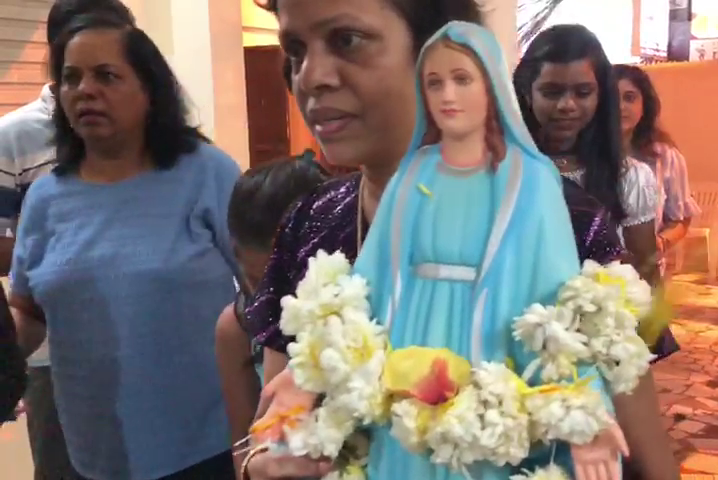Panaji: October 13, 2014 …. Union Minister for Parliamentary Affairs, Shri M. Venkaiah Naidu has said that quality of performance of Members is a most important variable in the working of any Parliamentary Institution. It is the primary duty of every Member irrespective of his party affiliations to maintain and project a good image of the House by his conduct both inside and outside the Legislature.
Delivering his inaugural address at the two day 16th All India Whips Conference at Cavelossim, today, Shri Naidu said inadequacy of education and training in the operational mechanics of parliamentary polity and the working procedures of modern parliamentary institutions adversely affects the performance of the legislators. He said our country is the largest democracy in the world. Democracy envisages solving public problem through debate and discussion. In our democratic system, while the treasury benches have their way in the House, the opposition must have its say. He therefore suggested one simple mantra to all Parliamentarians to strictly adhere to ‘Debate, Discuss and Decide and don’t Disturb’.
The Union Minister said the chief patrons of our democracy, the people of our country, are in general not very happy and upbeat about the way our Legislatures are functioning over the years. The other being that there is a new sense of hope and enthusiasm among the people of our country, who have elected Shri Narendra Modi, as Prime Minister, he said. He referred to this because proper and vibrant functioning of our Legislatures is essential to convert this new hope and enthusiasm into reality, so that the aspirations of the people, so clearly reflected in the last general elections are realized. In this sense, this meet assumes significance.
He said Chief Whips and Whips have very important roles in the Parliamentary system. Management of government business demands lot of skill and dexterity on the part of Government whips. They attend to the ground realities of proper functioning of legislatures. The day to day functioning of parliament and legislators involves close coordination between the whips of different parties to ensure that government business gets through. They look after attendance of members, keep them informed of the turn of events in the Houses from time to time and enable their participation in various debates based on their aptitudes and abilities, work as key links between the party and its chief and the Houses, participate in agenda setting for the Houses etc. He said in today’s era when sensational news like noisy scenes and walk outs from Parliament are given wide coverage, the effective presence of the Whip becomes all the more necessary. Now Anti Defection Law has increased the powers that were given to the whips immensely. If a Whip is issued and if it is not followed by the Members, that Member becomes liable to lose his membership of the Legislature and that is why the Whips have to be issued he added.
He opined that the burden and the duties which the Whips have to carry, has increased and has become more onerous in Parliamentary form of Governance.
In essence, Whips are the conscience keepers of legislatures. The critical role of Whips had been acknowledged right in the beginning itself by holding the First All India Whips Conference in 1952 at Indore, i.e. within the first year of general elections to the first Lok Sabha.
The Parliamentary Affairs Minister said our country is into 16th Lok Sabha and as an Independent Nation, we are into the 68th year. When we as a Nation began our march on the path of democracy, there were doubts expressed in several quarters about our ability to walk for long on this path. However, we have proved the doomsayers wrong. We strongly defend our democracy and the individual rights that come along with it. But, at the institutional level, we don’t seem to be doing justice to them. Public perception about the functioning of our Parliament and state legislatures is a matter of serious concern. Credibility of these vital institutions is eroding for various reasons including criminalization of politics, rise of money power, declining number of sittings of the august Houses, repeated disruptions and adjournments, questionable conduct of some legislators inside and outside the Houses etc. This cannot go on like this. It is time we strive for a change the way we operate our sacred institutions of democracy, he said.
Our first Prime Minister late Shri Jawahar Lal Nehru cautioned us decades ago that all institutions, including the Parliamentary Institutions, tend to break up if they are not in accordance with the thinking and aims of the people. Our present Prime Minister Shri Narendra Modi, in his maiden speech in Parliament described Parliament as the ‘Temple of democracy’ and assured the people that ‘every effort will be made in this august institution to meet the hopes and aspirations of the common man.’ What is to be done in this regard?
Shri Naidu said we use tax payer’s money for running our legislatures. But the number of sittings of legislatures per year has been steadily declining. During the first 37 years since the first general elections to the Lok Sabha in 1952, i.e from the first Lok Sabha to the sixth, there used to be more than 100 sittings each year.
The first Lok Sabha still hold the record with 132 sittings per year. During the sixth Lok Sabha(1977-79), the average sittings per year was 108. For the first time, this fellow below 100 during the seventh Lok Sabha (1980-84) and the slide continued. Out of the 15th Lok Sabhas, ten have run have full course. Of these ten Lok Sabhas, the 14th and the 15th Lok Sabhas i.e during 2004-14, the average annual sittings have been the lowest at 67 and 71 per year respectively.
The scenario regarding annual sittings is even worse in case of state legislatures. In this context he cited the example of the Legislative Assembly of Haryana is reported to have met only for 56 days in five years during 2009-14 which means about just 11 days per year.
He said during the first coalition central government that was in office during 1977-80, the average sittings of Lok Sabha were 108 per year but during the coalition governments that were short lived during 1989-91, 1996-97 and 1998-99, the average sittings of Lok Sabha were very low in the range of 62-76 sittings per year.
It is true that governments have come to shed some of their regulatory and even policy making functions but at the same time several new complexities and challenges have emerged. Issues relating to globalization of economy , WTO related issues, fiscal management, management of prices, gender related issues, new models of investment promotion, new areas like patents, bio-technology and genetic modification of crop varieties, agriculture crises, bilateral and regional issues of economic cooperation including avoidance of double taxation, terrorism, regional and global developments that impact economic development, issues relating to electronic communication, new social issues including demographic changes and their implications for policy, growing tensions etc., warrant elaborate debates.
The Minister suggested to consider stipulating a minimum of 40 sittings per year in case of small states, 70 in case of other states and a minimum of 100 days per year for the Parliament. Further compounding the problem of declining number of sittings is frequent disruptions and forced adjournments with the Houses not transacting any business for days on. One of the prime functions of legislatures is to ensure ‘accountability of permanent executive’ through various means including the ‘Question Hour’. It is depressing to see that disruption of such an important window of ‘Parliamentary Oversight’ has come to become a ‘routine way of political expression’. This has serious implications.
I would like to assure this august gathering that I will take necessary lead in convening meetings of the Whips of all parties represented in the Parliament both ahead and during the sessions. I will do the needful to ensure that they feel more involved in ‘Parliamentary management and functioning’ for realizing the intended goal of enhanced functioning of Parliament. He suggested to hold such conferences once in every four years.
Lok Sabha has unanimously resolved on two important occasions that its members shall act in such a way to preserve and enhance the prestige of Parliament. On the occasion of the Golden Jubilee of Independence, the Lok Sabha members have resolved to maintain the inviolability of the Question Hour and refrain from entering the well of the House. Again, on the occasion of the 60th Anniversary of the First Sitting of Parliament on 13th May, 2012, the members solemnly reaffirmed to uphold and maintain the dignity, sanctity and supremacy of Parliament, to make Parliament an effective instrument of change and to enhance the accountability of Government towards the people through the oversight of Parliament.
But in reality, these solemn affirmations are followed more in breach than in practice resulting in negative perception among the people about our legislatures. This shall be checked before it is too late and beyond redemption. I would hence, appeal to this august gathering to seriously consider a Code of Conduct for elected representatives that will be actionable.
The conference was organized by Ministry of Parliamentary Affairs, Government of India and Government of Goa.
Shri Afzal Amanullah, Secretary, Ministry for Parliamentary was present.
Earlier Union Minister of State for Parliamentary Affairs, Shri Santosh Kumar Gangwar, who welcomed the participants which included MP’s for Loksabha, MP’s for Rajya Sabha, Members of Legislative Assembly from across the country informed that the first Whip Conference was held at Indore in 1952. He highlighted the significance of Whip Conferences to strengthen democracy in the country.
Speaking further, Shri Gangwar said in view of advent of electronics media the people are more aware of the issues debated in the House and therefore more onus cast on the elected representatives to have debates on these issues in right perspective.
The participants will deliberate on issues such as increasing role and responsibility of Whips, ensuring discipline and decorum in the House, code of conduct for Members of Parliaments and Legislatures and use of information and communication technology among the other related issues during two day conference.




